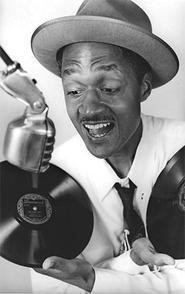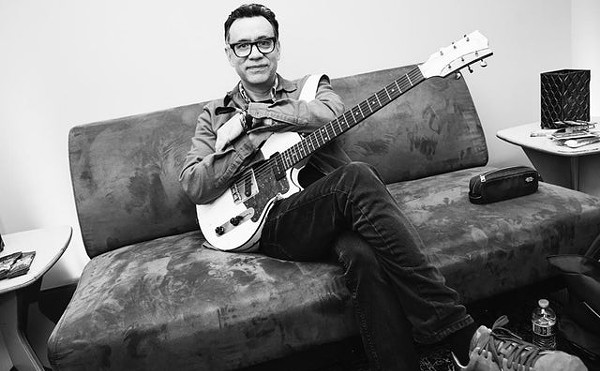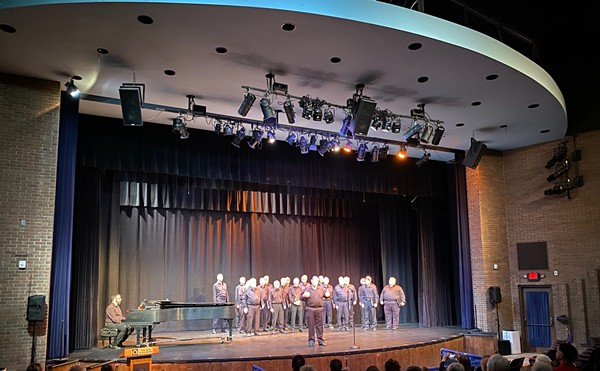Such is the task playwright and sole performer W. Allen Taylor assigns himself in the autobiographical Walkin' Talkin' Bill Hawkins: In Search of My Father, now at Dobama. Taylor is an actor of considerable skill and immense charm, which goes a long way in saving a script that never really digs into the pain of dealing with an absent parent -- particularly when Dad was nearby for the first two decades of the son's life.
The play's title is the sobriquet of Cleveland's first African American disc jockey. From his storefront studio near East 105th and Cedar, Hawkins spun street-slick rhymes ("I'm gonna put some dip in your hip and some glide in your stride") from 1948 through the 1950s and built an impressive following in the black community. Quite the ladies' man, the married Hawkins had an affair with Sarah Taylor, who gave birth to William Allen in 1953.
Since Hawkins decides not to leave his wife, everyone keeps mum about the baby's father. And so it remains until W. Allen graduates from Ohio State University. At his graduation party, Sarah finally admits to her son that his father is the famed hometown DJ. Excited beyond measure at the news, W. Allen's hopes for a meeting are dashed when he learns that Hawkins has died just a few months before.
Obviously, there are plenty of juicy familial issues on the table here, accented by a couple of ironic touches. For one, W. Allen became a DJ himself when he was in college, without knowing anything about his father's occupation. And while home on break one summer, the young man was actually interviewed by his father, who was working for the Urban League at the time. Hawkins never let on who he was.
That poignant interview scene, occurring late in the 90-minute show, demonstrates why this production never achieves the emotional traction it needs. Director Ellen Sebastian Chang stages this moment in shadows, with Hawkins barely visible. And Taylor has written it so that we only hear Hawkins speaking -- even though Taylor handles both ends of the dialogue in earlier scenes. By denying us the opportunity to experience this meeting in all its awkwardness and intensity, the audience is kept at arm's length from Taylor's pain.
Indeed, much of Hawkins feels like a dramatization of the author's research notes, rather than a revealing psychic journey. Taylor uses real and composite characters to trace the path of his father from Pullman porter to local radio icon. But everything happens in the past tense; it's not played out before our eyes. Sadly, we get only a couple of short snatches of Bill Hawkins himself, so we're left to imagine how magnetic his personality, on- and off-air, really was.
Taylor tries to add some zing to the parade of facts by introducing an alter ego -- the Kid, a hip and uninhibited DJ, who has no problem confronting "Daddy-O" (in the abstract, of course) and detailing the anger that is bubbling just under the surface. But these feelings, no matter how well-stated, are still one step removed from the obedient, father-deprived son.
Even though the show is fairly short (extended by an unnecessary intermission), there are too many irrelevant scenes. For example, the fact that Taylor gave up playing the piano as a boy because he was being teased by schoolmates is a forced indicator of his inability to "be himself."
As a performer, Taylor is an immense pleasure to watch, switching effortlessly into different characters by using small facial expressions, subtle vocal mannerisms, and altered postures. He is a perfect squirmy nine-year-old, reacting in horror when his uncle decapitates a turkey in the backyard for dinner. And Taylor precisely sketches others, including his dignified mother, a semi-sleazy club owner, and a fey piano teacher.
Overall, the audience needs to love Bill Hawkins so that they can sense the hurt and loss his son feels. To do that, we have to see Hawkins in action more -- like when he is selling Hot Sauce Williams' rib joint on his radio show: "It'll make you chew on the bone long after the meat is gone!" Without that, any factual recitation of Hawkins' life, even one as well-acted as this, pales in comparison to actually experiencing the man himself.













